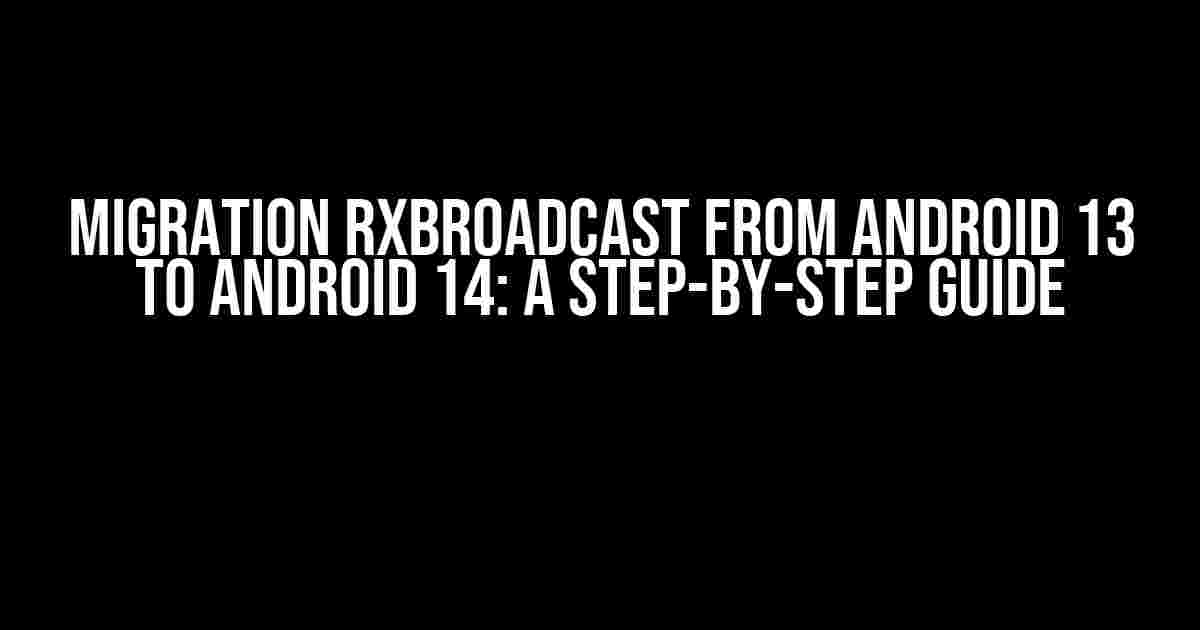Are you ready to take the leap and migrate your RxBroadcast implementation from Android 13 to Android 14? Look no further! In this comprehensive guide, we’ll walk you through the process, highlighting the key changes and considerations you need to be aware of. Buckle up, and let’s dive in!
What’s changed in Android 14?
Before we dive into the migration process, it’s essential to understand the changes introduced in Android 14 that affect RxBroadcast. Google has made significant changes to the way broadcasts are handled, aiming to improve performance, security, and overall user experience. Here are the key takeaways:
- Broadcast receiver registration: Android 14 introduces a new way of registering broadcast receivers, which is more efficient and secure. You’ll need to adapt your app to use the new APIs.
- Context-registered receivers: In Android 14, context-registered receivers are no longer supported. You’ll need to switch to using application-registered receivers instead.
- Explicit intent filtering: Android 14 requires explicit intent filtering for broadcasts. This means you’ll need to specify the exact package name and class when registering for broadcasts.
Preparing for migration
Before you start migrating your RxBroadcast implementation, make sure you’ve got the following in place:
- Android 14 SDK: Ensure you’re using the Android 14 SDK (API level 33) or higher in your project.
- RxBroadcast library: Verify that you’re using the latest version of the RxBroadcast library, which supports Android 14.
- Code organization: Review your code structure and organization to ensure it’s well-maintained and easy to modify.
Migrating RxBroadcast from Android 13 to Android 14
Now that you’re prepared, it’s time to start the migration process! Follow these step-by-step instructions to migrate your RxBroadcast implementation:
Step 1: Update broadcast receiver registration
In Android 14, broadcast receiver registration has changed. You’ll need to update your code to use the new APIs. Here’s an example:
// Old way (Android 13 and lower)
IntentFilter filter = new IntentFilter("com.example.ACTION_EXAMPLE");
registerReceiver(new MyBroadcastReceiver(), filter);
// New way (Android 14 and higher)
IntentFilter filter = new IntentFilter("com.example.ACTION_EXAMPLE");
getContext().registerReceiver(new MyBroadcastReceiver(), filter, null, null);
Step 2: Switch to application-registered receivers
In Android 14, context-registered receivers are no longer supported. You’ll need to switch to using application-registered receivers instead. Here’s an example:
// Old way (Android 13 and lower)
registerReceiver(new MyBroadcastReceiver(), filter);
// New way (Android 14 and higher)
getApplicationContext().registerReceiver(new MyBroadcastReceiver(), filter);
Step 3: Implement explicit intent filtering
In Android 14, explicit intent filtering is required for broadcasts. You’ll need to specify the exact package name and class when registering for broadcasts. Here’s an example:
IntentFilter filter = new IntentFilter("com.example.ACTION_EXAMPLE");
ComponentName componentName = new ComponentName("com.example", MyBroadcastReceiver.class);
filter.addDataType("image/*");
getContext().registerReceiver(componentName, filter, null, null);
Troubleshooting common issues
During the migration process, you might encounter some common issues. Here are some troubleshooting tips to help you overcome them:
| Issue | Solution |
|---|---|
| Broadcast receiver not receiving intents | Verify that you’ve updated the broadcast receiver registration to use the new APIs. Ensure that the intent filter is correctly set up and the receiver is registered in the application context. |
| SecurityException when registering broadcast receiver | Make sure you’ve implemented explicit intent filtering and specified the exact package name and class when registering for broadcasts. |
| RxBroadcast compatibility issues | Verify that you’re using the latest version of the RxBroadcast library, which supports Android 14. If issues persist, check the library’s documentation for any specific migration guidelines. |
Best practices for RxBroadcast in Android 14
Now that you’ve migrated your RxBroadcast implementation, it’s essential to follow best practices to ensure your app works seamlessly in Android 14:
- Use explicit intent filtering: Always specify the exact package name and class when registering for broadcasts to ensure security and avoid conflicts.
- Register receivers in the application context: Use the application context to register broadcast receivers, as context-registered receivers are no longer supported.
- Test thoroughly: Verify that your app works as expected on different Android 14 devices and configurations.
Conclusion
Migrating your RxBroadcast implementation from Android 13 to Android 14 requires attention to detail and a solid understanding of the changes introduced in Android 14. By following this step-by-step guide, you’ll be able to adapt your app to the new APIs and ensure a smooth user experience. Remember to follow best practices and test your app thoroughly to avoid any issues. Happy coding!
Additional resources:
- Android Documentation: BroadcastReceiver
- RxBroadcast GitHub Repository
- Android 14 Developer Documentation
Here are 5 Questions and Answers about “Migration RxBroadcast from android 13 to android 14”:
Frequently Asked Question
Get the scoop on migrating RxBroadcast from Android 13 to Android 14!
What is RxBroadcast and why do I need to migrate it?
RxBroadcast is a popular library for Android that allows you to broadcast intents between app components. However, Android 14 has deprecated the `android.os.Broadcaster` class, which RxBroadcast relies on. This means you’ll need to migrate to a new broadcast mechanism to ensure your app stays compatible with the latest Android versions.
How do I migrate RxBroadcast to Android 14?
The good news is that the Android team has provided a replacement for `android.os.Broadcaster` called `androidx.localbroadcastmanager.content.LocalBroadcastManager`. You’ll need to update your app’s build.gradle file to use the new library, and then refactor your code to use the new broadcast mechanism.
What are the benefits of migrating RxBroadcast to Android 14?
By migrating to the new broadcast mechanism, you’ll ensure your app stays compatible with Android 14 and future versions. You’ll also benefit from improved performance and security, as the new mechanism is more efficient and secure than the deprecated `android.os.Broadcaster` class.
Will I need to change my app’s architecture to migrate RxBroadcast?
In most cases, you won’t need to change your app’s architecture to migrate RxBroadcast. The new broadcast mechanism is designed to be backward-compatible, so you should be able to refactor your code without making significant changes to your app’s overall structure.
Are there any known issues or limitations with migrating RxBroadcast to Android 14?
While the migration process is generally straightforward, some developers have reported issues with compatibility and performance. Be sure to test your app thoroughly after migration to ensure everything is working as expected, and reach out to the Android community or RxBroadcast maintainers if you encounter any issues.


